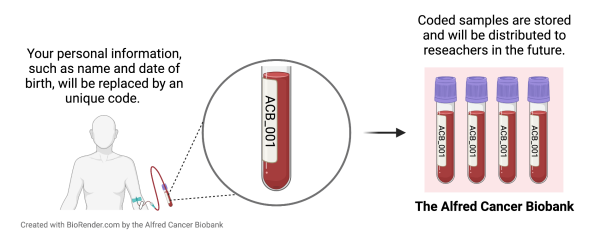Being a biospecimen donor
Biospecimen samples are crucial for research into the prevention, diagnosis, and treatment of cancer.
Our Commitment to Patients Come First
Providing high-quality patient care is our top priority. Our cancer research is an important way of improving patient outcomes in the future. Although donors do not necessarily benefit directly (such as financially) from participating in the Alfred Cancer Biobank (ACB), their participation is critical for advancing cancer research.
Participation in the ACB is completely voluntary and you can withdraw your consent at any time. Your treatment will not be affected in any way whether you decide to participate or not.
I have been asked to participate in the Alfred Cancer Biobank (ACB), but why should I participate?
Cancer research relies on the donation of biospecimens (samples) from patients with cancer, or at risk of cancer. If you choose to donate samples, they will be very valuable for research into the prevention, diagnosis, and treatment of cancer.
By allowing us to store your samples you can contribute to cancer research to investigate better treatments and ways of detecting cancer earlier. Your participation has the potential to help change people’s lives in the future.
How will my samples be collected?
This will be discussed with you prior to you agreeing to participate in the ACB. The type of sample collected will depend on the nature of your cancer and on our project requirements. Where possible, your samples will be collected around the same time you receive treatment.
For example, during your chemotherapy session, we might collect blood through the same needle that is used to deliver chemotherapy. Therefore, you will not be required to make a separate visit to the hospital, nor to have an additional needle inserted into your arm.
Are there any risks?
In some cases there may be risks. These will be discussed with you prior to your agreement to participate in the ACB. Risks are mostly related to the type of samples you have been asked to donate. For example, if you have been asked to donate a blood sample, the possible risks of the blood donation process include faintness, pain and bruising at the site of collection.
There are no risks in donating leftover tissues, urine, saliva and faeces.
How will ACB protect my privacy?
Your samples and health information will be stored safely, securely, and anonymously by the ACB. Although the ACB keeps a record of who has donated a sample, all samples are kept anonymous using code numbers, not names or personal details, as shown in the figure below. As such, when your materials are released to other researchers, they will not be able to find out who you are.

What will my samples and information be used for?
Samples and information stored in the ACB are collected for future research, so it is not possible to know exactly which projects they will be used for. However, only projects that contribute to our knowledge and treatment of cancer will be approved. If you would like to know more about the projects that may be using your samples, please visit Our Projects webpage or contact us directly via acb@alfred.org.au.
You can also ask your doctor for more information.
